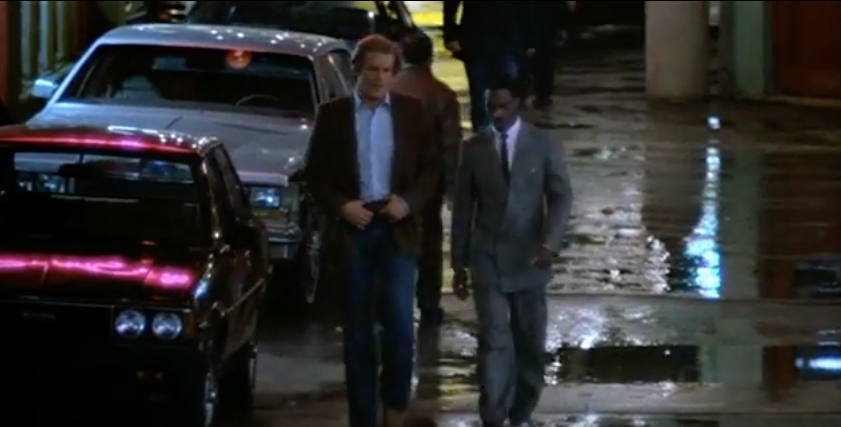When discussing Canadian filmmakers, there are certain names that always crop up. James Cameron, David Cronenberg, Atom Egoyan, Denis Villeneuve; these are all names that are considered synonymous with Canadian cinema, and deservedly so, given the contributions made not just to their own national cinema, but the medium as a whole. Yet, there are lesser known Canadian filmmakers whose names have slipped through the cracks of pop culture, despite having made significant contributions of their own to the visual medium. Roger Spottiswoode is one such person, as he is a credited co-writer of 48 Hrs., which is considered to be the first ever entry in the “buddy cop” genre.
This 1982 feature opens to the prison escape of Ganz (James Remar), a violent criminal with little qualms about committing murder, especially when it comes to obtaining the money gained from the very crime for which he was incarcerated. Enter Inspector Jack Kates, a dutiful, but rough-around-the-edges cop who has it all: a job that overworks him, a beautiful girlfriend he neglects, and more than a penchant for drinking. After two fellow officers are murdered by Ganz, one with Jack’s own handgun, the Inspector seeks the assistance of convict and former Ganz associate, Reggie Hammond (Eddie Murphy), to put an end to the escapee’s murderous spree.
Directed and co-written by Walter Hill, an American filmmaker renowned for his own influence on the Western and action genres, 48 Hrs.’ initial plot structure might seem overly familiar in parts, especially given the pervasive presence of the buddy genre tropes today, but do not be fooled. This is an ‘80s film containing nuances that were ahead of its time, while somewhat ironically transcending the very subgenre it created.
What initially struck me was the fluid snappiness of the screenplay by Spottiswoode and his co-writers, which benefits greatly from Hill’s solid, kinetic direction. This brings me then to the cinematography, which to my surprise is one of the resounding technical achievements of 48 Hrs. There is one particular scene in Jack’s precinct, immediately after the shooting of the officers, which is done as one long seamless take, perfectly capturing the reverberating discord of the entire station after having lost two of their own. The way in which it is shot adds a chaotic weight to the scene that simply would not have been so prominent had there been cuts used, and is a technique rarely found in the action comedies of today.
Of course, the glue which holds the film together is the outstanding chemistry between Nick Nolte and Eddie Murphy. The two work perfectly together, and in hindsight it is odd to think that the actors did little work together outside of 48 Hrs. and its poorly-received 1990 sequel. There is a great comedic balance offered between Nolte’s gruffness and Murphy’s charismatic charm, but the true nuance of their relationship is their racial interplay.
The now well-established formula of the buddy cop genre dictates that the two come from different backgrounds, and continue to bicker and argue until they find a common ground of mutual respect. Where 48 Hrs. differs from many of its counterparts to this day, is that racism is at its center thematically. While it is initially disconcerting to hear Nolte’s Jack occasionally fire racially derogatory terms at Murphy’s Reggie, his subsequent apology for the remarks, in which he admits to letting his instincts as an officer get the better of his words while still acknowledging the inexcusable nature of his actions, is both refreshing and humbling from a character as stubborn as Jack. It serves as a welcome “save the cat” moments for his character arc, while also admirably exemplifying effective communication, understanding and respect between different races.
While its thematics are well-conceived, there is a degree of uneven storytelling present, even in spite of its trim 96-minute runtime, which rests squarely with Jack’s underappreciated girlfriend Elaine (Annette O’Toole). Upon conclusion this narrative thread feels inescapably unresolved, especially given Jack and Reggie’s numerous conversations on women, as it is ultimately wrapped up with a throwaway line that adds little purpose to the relationship. However, I believe this was done in favour of focusing on the immense chemistry between Nolte and Murphy, especially in the film’s latter half, so at best it is an understandable shortcoming, and at worst it is no more than underdeveloped character-building.
Minor narrative issues aside, 48 Hrs. is a film that carries timely commentary on racial relations which still hold up today, elevated by strikingly accomplished filmmaking, and a story that excitingly zips by thanks to sharp dialogue and a sincere comradery between its two leads. It is of little surprise then that this, Murphy’s feature film debut, immediately launched the career of the legendary actor and comedian, all the while opening the door for a whole subgenre of action comedy films. This consequently led to classics such as Beverly Hills Cop (which then made Murphy a household name), Lethal Weapon, and The Other Guys, so to Walter Hill, Roger Spottiswoode and all those involved: cinema salutes you!

